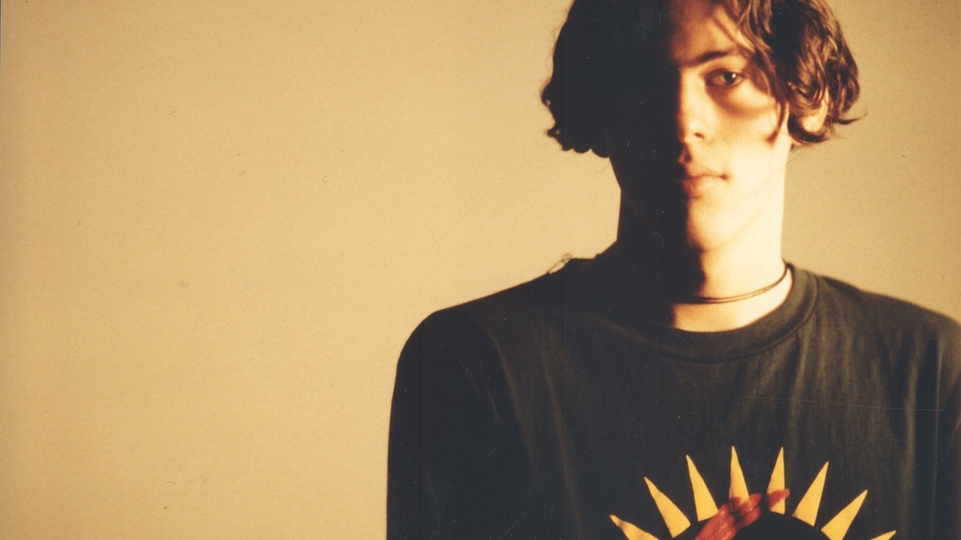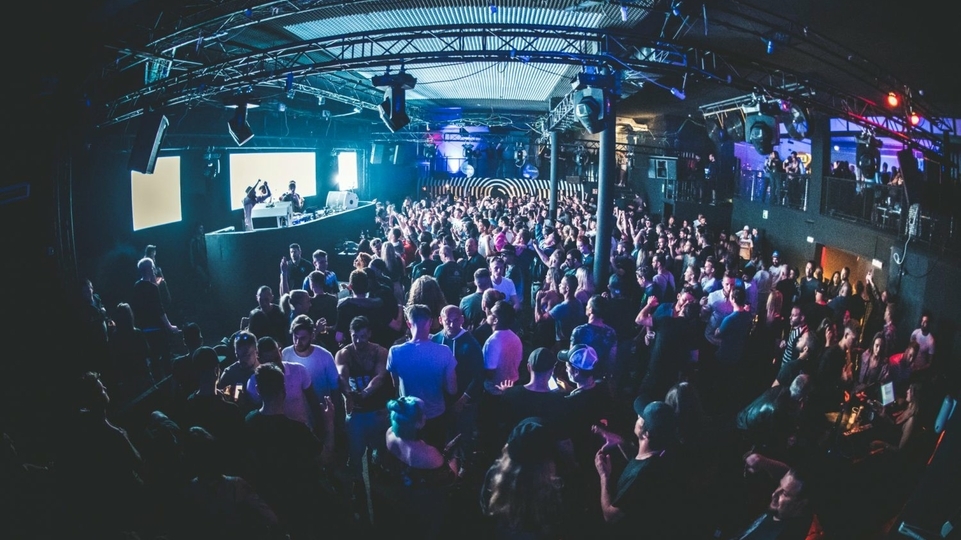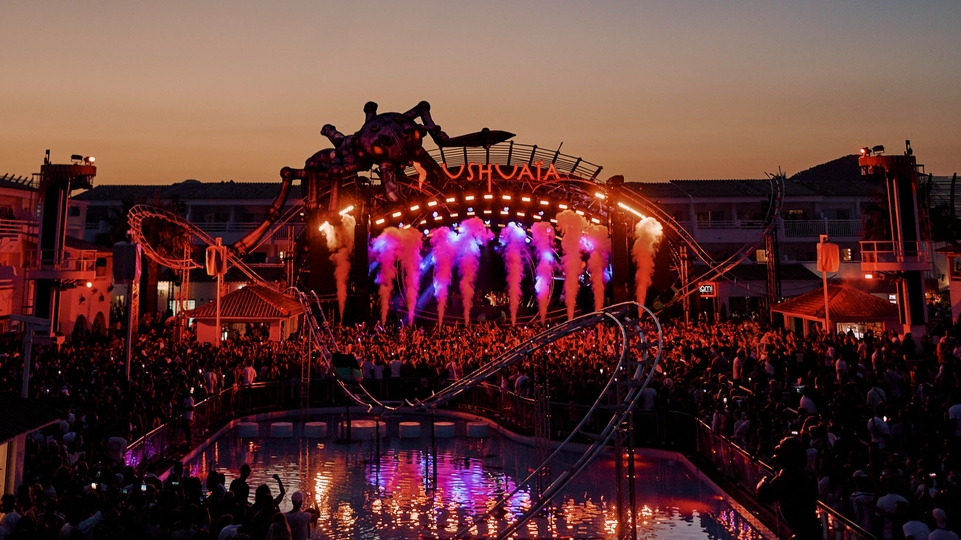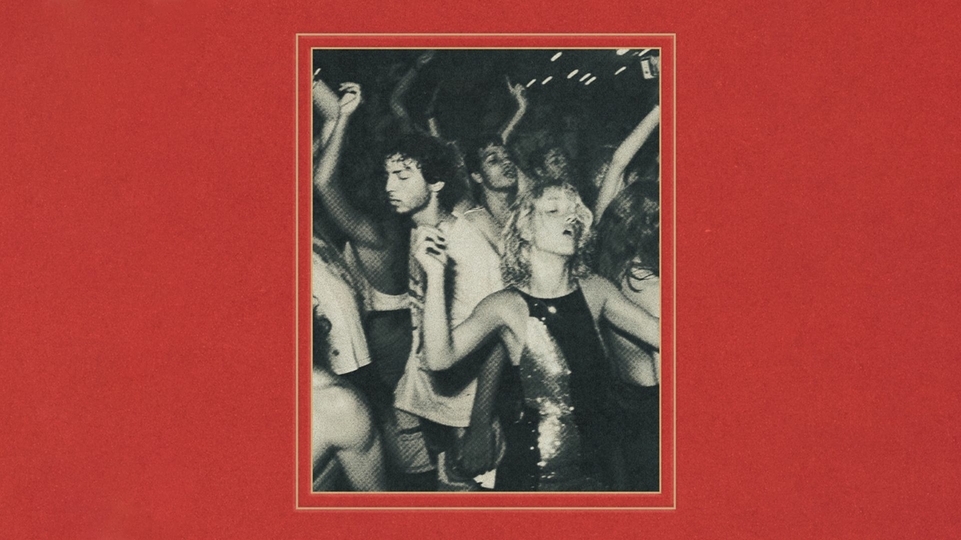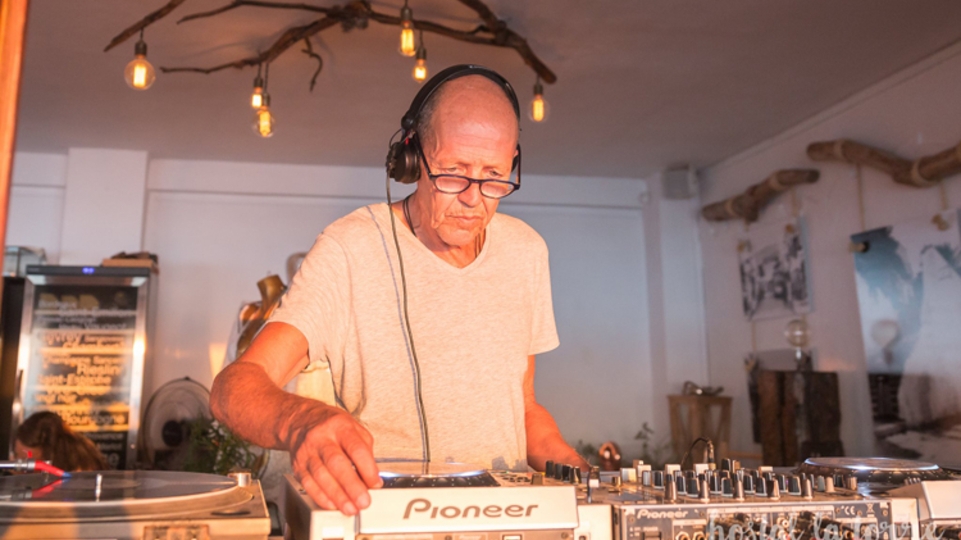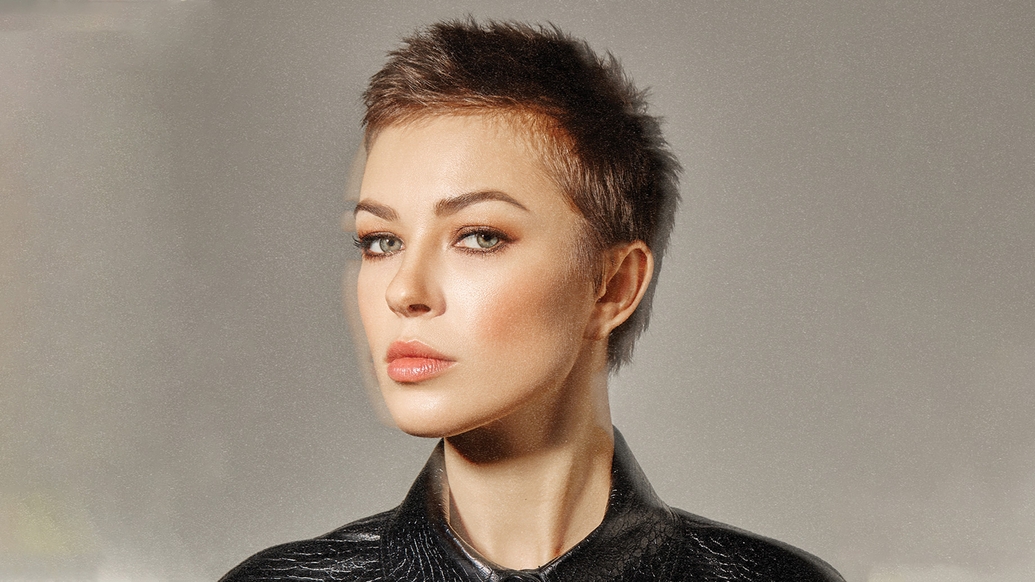
Nastia is the techno outlier going against the grain
Ukraine’s Nastia could be techno’s most outspoken DJ — a world famous artist who matches her razor-sharp skills behind the decks with an honesty on social media that some find difficult to take. Though she’s one of the biggest DJs in the world, she’s determined to do things her way, even if it means turning gigs down or shunning the oft-taken production route. Ahead of a gig at Tresor, DJ Mag meets her in Berlin to find out what she thinks of festivals, her peers and the DJing life...
Pics: MICHAEL FEDORAK
Stylist: MARIA MIGOTINA
Live pics: ANNIKA WALLIS & KHRIS COWLEY
When DJ Mag meets Nastia in the lobby of her upscale Berlin hotel one rainy winter’s afternoon, she doesn’t smile, and almost looks a little worried. “I woke up at 2pm,” she says, as though she’s done something wrong. “I’m still jetlagged from my American tour.” As hotel management find us a quiet place to speak, she shows us pictures on her phone of her recent gig in New York City, where she played with Richie Hawtin and Amelie Lens at Avant Gardner. DJ Mag asks her how it was. “It was okay. Americans are different,” she says, sounding a little disappointed.
We follow management into the hotel’s brightly-lit conference room, and as we sit down, she explains what she means. “America used to be good, as we know, in the ‘80s and beginning of the‘90s. But then it got very commercial and cheesy. If you want to play interesting music, then you don’t get many people interested.” Younger generations, she says, aren’t all that keen on weekly clubbing experiences, preferring the occasional big festival with less sophisticated music instead. She thinks this is the reason for the recent closure of Brooklyn club Output. “It was my favourite, actually. I was really sad.”
ARMOUR
For those who already know Ukraine’s Nastia, real name Anastasia Topolskaia, that kind of post-party report will be nothing new. Along with her status as one of today’s most in-demand techno DJs, she’s widely known for being unapologetically honest — even when it gets her in trouble. Honesty is her armour, her “self-protection”, she says. It’s “the greatest and biggest weapon” against anything that might come her way. And during our nearly two-hour conversation before her gig at Tresor later that night, she holds nothing back, revealing thoughts about completely leaving the DJ scene over resentments towards an industry she feels has swallowed her life whole.
That’s not to say she’s full of hate — quite the opposite. Even when she’s serious, she never seems tense or angry, only truthful. She’s honest about what she loves, what she likes and everything she doesn’t. That kind of forthrightness can be jarring, especially in an industry like hers. “In techno, it’s politics,” she later grumbles. But it can also be necessary, especially when the topics are fatigue and burnout, both of which she felt intensely this year. “I had a very bad summer, very hard and heavy,” she says. It wasn’t just a few bad gigs. Flight cancellations caused her to miss a close friend’s wedding and the birthday of her god-daughter. In private, she cried. In public, and with no one else to turn to, she vented on social media. “It’s like visiting a psychotherapist when you speak out,” she says.
Her complaints reached boiling point in late July, after a long-winded screed detailing her difficult trip from Romania to Ibiza caught widespread backlash from fans, who accused her of being ungrateful. “It’s fair,” she says about the reaction. “You still live an amazing life that everyone is dreaming about.” A few months later, and she was joking about her reputation for anger, sharing a meme in October of a shaven-headed Britney Spears wielding an umbrella during the pop star’s infamous 2007 attack on the paparazzi. The photo was captioned, “Rare footage of Nastia kicking off after another unsuccessful gig/bad soundsystem/delayed flight/rubbish promoter.” It was funny, though not something DJ Mag expected Nastia to re-share. “Why are you surprised?” she gently laughs. Her intense online persona didn’t exactly lend itself to self-deprecation. “I love it,” she says, smiling. “I wish I could see more memes about myself. I will share them, because it makes people take you less seriously; it lets people realise that you’re just a normal girl.”
Of course, Topolskaia isn’t really all that normal. When it came time for her young daughter’s bring-your-parent-to-class day at her primary school in Kiev, Topolskaia showed up with her DJ equipment at the request of the teacher, who said it was progressive and modern. Naturally, the kids loved it, and the story exploded in the press, though Topolskaia thought it would be boring. “I didn’t find it so special, because for me it’s normal,” she says flatly, still looking a little confused. “You know, it’s my job.” Not everyone’s mother is a world famous DJ, DJ Mag reminds her. It is unusual. “Is it?” she asks. “But there are so many — I mean, why don’t other DJs do the same, you know? It’s so easy in the end.” DJ Mag doesn’t have an answer.
Topolskaia speaks quietly, occasionally leaning in closely to whisper her answers to a question. Unless she’s imitating whomever it is she’s speaking about — then, she becomes animated until bursting with laughter. Otherwise she doesn’t often make eye contact, instead looking up and to the right as she thinks about what to say next, hands resting across her stomach, which today is covered by a huge black leather belt with metal rings and zips criss-crossing it at all angles. In person, she’s just as stylish as she presents herself online. She’s wearing a black-ribbed turtleneck that shines immaculately under the fluorescent lights, with what looks like a second grey turtleneck peeking out from underneath. Her silver, wing-shaped earrings give her an aerodynamic look, a little like she’s flying while sitting still, which is compounded by her short hair. Blood-red nail polish shined to brilliant perfection adorns close-cropped fingernails, which guide her hands in graceful circular motions as she talks.
“I feel like doing something interesting today,” she says about her debut at Tresor. She’s excited, but also often feels confused playing to international crowds in Berlin and Amsterdam. “Berlin lost its personal character because of the tourists,” she says. “Maybe there are a couple of clubs that I don’t know about, hidden by local Berliners. But basically all of the clubs are under the tourist invasion.” Unlike countries such as Romania, Georgia and Ukraine, where strong local clubbing communities make for tightly-bonded dancefloors, in Berlin she feels like it’s harder to know what works. “Every time I come, it’s different and very touristic. Not bad. Just different.” DJ Mag brings up Ibiza, where the crowds are almost entirely international tourists, and where she seemed to have had fun playing at Hï this summer. She shrugs it off. “I mean, you have to choose one party which you liked from the season,” she says. She then admits her happiness there came from finally feeling confident enough to play whatever she wanted to without worrying about what the crowds or promoters might like. “I’m actually very tired of being flexible for that,” she says.
BREAKING POINT
So tired, in fact, she hit her breaking point this October. Something “clicked”, she says, and she realised she “can’t do this anymore”. Initially, she thought about retiring from DJing completely. She told her manager, who understandably panicked. After cancelling her Australian tour, together they decided she would take time off touring all the way through the summer. “I’m not going anywhere for even one week,” she says. And she’ll only be playing on the weekends, with one weekend off every month. She also wants to exclusively play club shows again, even though it will mean smaller fees and less exposure. But she’s not afraid of what might come. “Maybe people will talk less about me, maybe I will have less fees. But in the end,” she says, “if I do it for promotion or for money, I feel like a slut.”
DJ Mag can’t help but wonder if there are other DJs who feel like she does. The festival game can be an alluring one. The pay cheques are large and there is plenty of exposure. The right set at the right festival in front of the right people will ensure your gig calendar stays full. But when you feel like you’re constantly compromising to keep everyone happy, what looks like success can feel like a never-ending loop of missed flights, sleepless nights, stressful days, unfulfilling performances, and time away from those who matter most. Surely she can’t be the only one who’s unsatisfied. “I don’t know,” she says. “I’m a super outsider, actually.”

“I hate festivals... I don’t really get big stages, because there is no energy. No vibe. You’re so disconnected with people, alone on the big stage, so far away you don’t even see the faces. I don’t think it’s good for the culture. I don’t even know if it’s good for money.”
While she sees other artists at shows and pre-party dinners, there isn’t anyone she feels close to. “It’s not like I’m talking to them in my messages or on the phone or whatever. So I don’t have friends, like real friends, in this industry,” she says. Partially, she sees this as an inevitable side-effect of success. DJs on her level are extremely busy people. But it’s also impossible for her to wish things were any different. Doing so would mean erasing her entire past as a mother. “The thing is, if you want to hang out with people from the industry, you need to go to the after-parties,” she says. Not only has Topolskaia never been much of a partier — she says she’s never taken drugs — but because she’s always had a daughter to return to, she’s never been able to treat touring as anything other than a job. “I gave birth to my child when I was 20,” she says.
As she was coming up in the scene, playing parties like the notoriously hedonistic Kazantip, where she was a resident from 2006 till 2011, people were eager to get to know her. “But I always had to run back home,” she says. “Like, I’m sorry guys, I can’t stay because my child is waiting for me. I need to compensate for the time we didn’t spend together. And there are not so many DJs like me, so not everyone could understand. Everyone thought I was very boring.” While everyone around her had comparatively few responsibilities beyond gigging and making friends on the circuit, Topolskaia focused on remaining a good mother despite the temptations of her vocation. And by her account, it worked. “She’s super independent, mature, quick and sharp,” she says about her daughter. “I see that I did a great job for her.” But that didn’t help Nastia’s status as an outsider.
Perhaps it shouldn’t be so surprising, then, when Topolskaia says she doesn’t want her daughter to follow in her footsteps. “I believe that she can do something more interesting in her life,” she says. “DJing is cool, but for me it’s not enough anymore.” She says she’s desperate to pursue passions outside of dance music, like going back to school, learning analogue photography, going back to dance classes, and learning how to cook. “To invite my friends and cook for them in my place,” she says. She misses the life she used to have. “I used to meet my friends. They used to come to my place. We had dinners. We had all night long conversations in the kitchen. Now it’s gone because I’m never there. I’m never there, even for my daughter.”
Topolskaia’s love for her daughter is apparent. Uliana Topolskaia floods her mother’s Instagram account. The two can be seen around the world together, sharing in the type of intimate moments rarely seen anywhere else in electronic music. Though if Uliana’s classmates are jealous of her far-flung adventures, mum wouldn’t know. “I’m not like asking her everyday, like, ‘How was school?’ because it’s so boring asking the same questions every day. I’m just trying to keep it natural.” That wasn’t always the case, at least when it came to nurturing Uliana’s interest in her mother’s job. Topolskaia’s ex-husband, Anatoly Topolsky, who is Uliana’s father, is also a DJ, known as “the godfather of drum & bass in Ukraine”. So while DJing is something their daughter is very used to, Topolskaia says she still doesn’t really understand what mum does for a living. And at times, she thinks it’s downright boring.
“I used to invite her to parties all the time,” she says, though only day parties, she later clarifies. But Uliana, who turns 11 in January, was often less than thrilled about the idea. “She’d say, ‘Uh mum’,” Topolskaia says, imitating her irritated child, “what am I going to do there? It’s so boring’.” Not wanting to leave her daughter alone in the hotel room, Topolskaia would insist she come despite her objections. Once at the party, Uliana withdrew. “She put her headphones on and played games on the phone. She was absolutely not interested.”

CONNECTION
That changed at this year’s Burning Man. Suddenly Uliana came alive. Topolskaia was playing before Carl Cox at his camp, opening to an empty dancefloor early in the evening. “And she was so happy. I saw her face. She was extremely happy,” Nastia says, beaming. “She was running around with people, bringing me some water from our camp, hanging out with my friends on the dancefloor, then she took a bike ride. When I finished, I said, ‘I’m so happy you’re finally here with me’. I waited for this moment. We hugged each other and danced together. It was very special. And I am waiting for that moment when — or if — she will be interested to go out with me, when she will come to me and say, ‘Mum, can I go to the party with you?’ So I stopped offering. I am waiting for when she will get curious. I don’t want to force it.”
Perhaps in this regard, empathy for her daughter comes from Topolskaia’s own experiences. She isn’t a person who likes to compromise. Yet she’s regularly done so over the last two years, playing gig after gig that she didn’t enjoy — particularly at festivals. “I hate festivals,” she says, slowly and forcefully, punctuating each word for effect. “I understand that I must do them, because it’s part of the process, but I never enjoyed any festival.” She then slightly corrects herself. “Maybe some of them, but those which had the club vibe, like this very intimate vibe when the DJ is very close to the people and I see everyone, and the stage is small,” she says, now leaning in closely and growing more animated. “I don’t really get big stages, because there is no energy. No vibe. You’re so disconnected with people, alone on the big stage, so far away you don’t even see the faces,” she says, holding her fingers against her temples in exasperation. “I don’t think it’s good for the culture. I don’t even know if it’s good for money.” She then says she’ll never play another festival in Amsterdam again, mentioning two parties by name. “I never had fun, not even once.”
It’s easy to empathise with Topolskaia. Her objections are borne from a place of passion, not pretence. Despite how outwardly bitter she might seem towards DJing at times, she hasn’t lost the energy for her craft that initially launched her to fame. Many long-time Nastia fans will remember grainy YouTube footage of a young Topolskaia playing Kazantip in 2009. She’d been booked at the event for the first time — one of her first gigs after one of the most difficult years of her life. She was living in Kiev with her one-year-old daughter, had just split with her ex-husband, and had very little money or gigs on the horizon. After a lucky break, she began hosting a show on Kiss FM Ukraine, which led to managing and playing the Kiss FM stage at Kazantip.
It was a return-from-the-dead moment for Nastia, who was then DJing as DJ Nastya Beauty. Wearing a green dress with bushy hair bouncing to every movement, she pumps and screams with the energy of a teenager to the burning techno track ‘Medusa’ by Loco & Jam. The video went viral, and changed her life, though she eventually came to deeply regret it, as promoters asked her to play the track at gig after gig. But she says she again felt that same energy at a festival this summer. She’d played a techno set for Elrow in Romania. “And the next day during the daytime, I played this drum & bass set. I was on fire,” she says. “Do you remember that video from Kazantip with the green dress? I’m going crazy. It was the same.”
There’s no denying Topolskaia’s gift for drum & bass. She’s called it “the first of all my loves”. Her sound is razor-sharp — a mixture of minimal, dubby, atmospheric and technical rhythms. She says she’d love to be booked for more drum & bass festival sets. But the passion she felt while playing this summer didn’t come just because she was able to play the genre she first fell for. Instead, she no longer had to worry about playing the game she currently feels so trapped by. “Every passion which becomes a profession, at one point, brings you different feelings,” she says. “If I play this festival, and there are promoters I’m interested to play for, I’m thinking, ‘Okay, I need to play the way they might like, and maybe after I will get a chance to play for them’.” But with no aspirations to become a famous drum & bass DJ, she says she felt free to express herself in any way she wanted. It’s a feeling she’s been missing. “That’s how I felt when I started to play in 2005,” she says. That doesn’t mean she doesn’t care about putting on a good show when she plays techno. Even when she isn’t happy with the event, she always does her best to make the crowd happy. “I still understand that I need to do my job.” But the gigs she feels passionate about are too few and far between these days, and continuing down the path that’s brought her so much fame is no longer an option.
“I never put myself like, ‘I’m the best, I’m gorgeous, I’m cool,’ this kind of stuff. As soon as you start doing this, flirting, using sexuality, then you get trolls. I just know this, and I never play with it.”
When DJ Mag asks if more time away from the road could mean more time for her label, Propaganda Records, she seems a little taken by surprise. “I think so. I mean, I didn’t think about it, but it’s a good chance, because I can do much more with music if I have more time at home.” Launched in 2013, the vinyl-only label has seen around two EP releases a year. This is partially due to time spent waiting for pressing and custom artwork, but the eternally busy Topolskaia has also had no interest in allowing anyone else to run her label.
“That’s why it’s so slow,” she admits. The last Propaganda release was the four-track various artists EP, ‘Zbirka’, which came in October, and featured half Ukrainian and half Russian artists, including Buttechno. The next Propaganda release will come via Spanish minimal techno producer ORBE sometime next spring. While visiting ORBE in his Madrid studio, Topolskaia offered advice on how to make his tracks sound “more powerful, stronger”. “But then he showed me his experimental tracks,” she says, “and I was like, ‘Fuck!’ I wanted to release it. It’s so good.” Much like Wareika’s 2010 album ‘Harmonie Park’ on Perlon, which is structured as a single 63-minute piece of music, one part of the EP will be dancefloor-oriented singles, and the other will be ambient and experimental tracks, pre-mixed. “Like a mini-album,” she says.
PEERS
Topolskaia has never been shy about her own lack of productions, once saying that “real DJs” don’t produce, and that she has no interest in learning. But as she heads into the next phase of her life, she says she might be changing her mind about the studio. While she does have one EP to her name, 2013’s ‘Maslo’, she insists she made it with a friend. “I’ve never done anything by myself, and I’ve always been honest about it.”
She’s sure of her ideas, which she’s honed after years spent making people dance, but fears that if she’d jumped into production on her own too early, she would have hated the result. Now she’s looking for a tutor, someone whose sound she admires and she can work with on a regular basis for the next few years. Specifically, someone who is strictly a producer. “They just stay in the studio making music for different people,” she says. Does that mean she’s still a real DJ? “Of course,” she says. “If I’m here on this level doing only DJing, that means something.”
She’s right. Production is seen by many DJs as the key to success. And Topolskaia is convinced that many popular DJs are making music using help — but perhaps being less honest about it. “I think it’s fine, everyone is doing that now, just pretending. It’s obvious. Sometimes when they are making posts on Instagram or whatever, trying to show how they work in the studio, it always looks ridiculous, because they try to hide that they don’t understand how it works,” she says. More of her trademark honesty, which she says helps keep her safe from the trolls. Don’t pretend to be something you aren’t, and the trolls will stay away. “I actually don’t feel like I’m getting trolls. My key with Instagram is to make it real. That’s why I’m so honest. And if I fail, I fail,” she says. “I never put myself like, ‘I’m the best, I’m gorgeous, I’m cool,’ this kind of stuff,” she continues. “As soon as you start doing this, flirting, using sexuality, then you get trolls. I just know this, and I never play with it.”
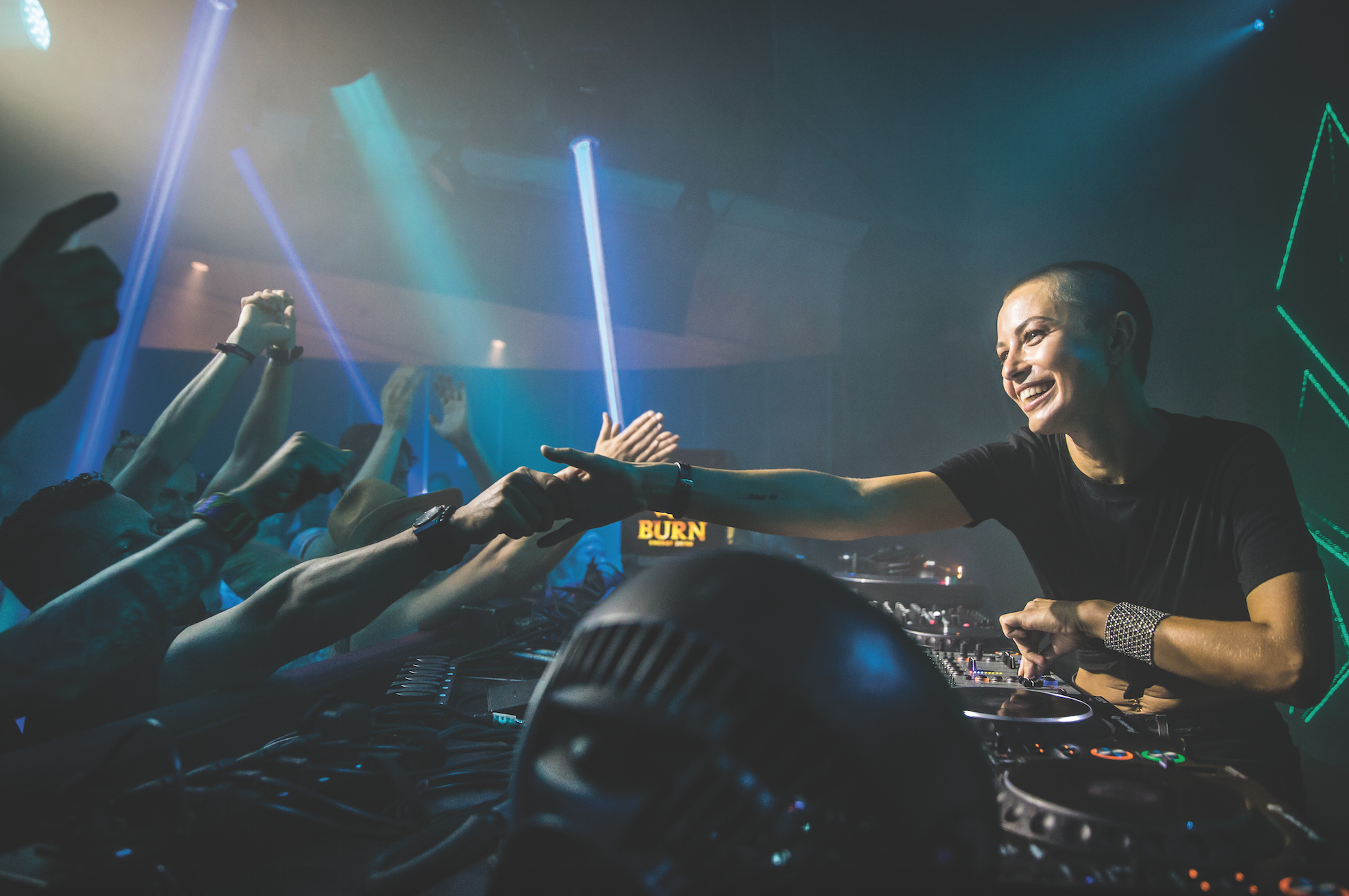
It’s this kind of outspokenness that has Topolskaia unafraid of leaving the scene behind. She’s certain she’s capable of becoming something else if she wants to. But before she does anything, she’s heading on holiday, her first in years. She played 220 gigs in 2016, and she’s hardly slowed down since. Looking back, she can barely believe it. “I think, ‘Oh my God, how crazy’. I’m still guessing what kind of health issues I will have later — not sleeping, flying too much.” But first, she’s signed up for a Vipassanāmeditation retreat in February, which she hopes will help her completely reset and find herself “for real”. The course will be, “10 days of meditating with no phone, no book, you can’t draw, you can’t talk,” she says. She’s never once meditated before, but in typically fearless fashion, announces that she can’t wait. “I believe that I’m missing soul food. I need it, because this life is not healthy.”
Anastasia Topolskaia is a complex, vexing and occasionally contradictory figure. From the outside, it can be difficult to understand why anyone would ever want to give up a life so many consider a dream. Few artists would. Even those who may also feel unhappy, but — as Topolskaia suggested during our conversation — may feel unable to leave, trapped by the fear that they’re incapable of doing something else with their lives. In that way, Topolskaia’s story can be understood as a cautionary tale; a reminder that success doesn’t always bring personal happiness or professional satisfaction. It’s all about getting the right balance.
By not really filtering what she says and — more importantly — being a great DJ, however, Nastia is taking on the world on her own terms. All power to her.
